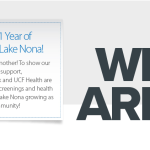Heart disease is the leading cause of death for men and women in the U.S., but many factors that contribute to this condition are within your control.
Cardiovascular disease is responsible for nearly one in three deaths in the United States, so it’s important to know the risk factors involved with heart disease and how to keep your heart healthy. While genetics play a role, there are significant, contributing risk factors for heart disease that are within your control. With some lifestyle modifications, you can reduce your risk.
“Changing certain factors in your lifestyle can be very impactful when it comes to lowering your risk for heart disease,” said Dr. Bernard Gros, cardiologist at UCF Health, the College of Medicine physician practice with a location in Medical City. “Targeting the cause and not just treating the risk factor is more powerful than any medication we have.”
Quit Smoking
Doctors have been saying it for years. The single best thing you can do for your health is quit smoking. Here’s why you should quit for your heart: Smokers have a higher risk of developing atherosclerosis — hardening of the arteries — which can lead to coronary heart disease and stroke. In fact, one-third of coronary heart disease deaths are attributed to smoking and secondhand smoke. Smoking also robs your body of good cholesterol, or HDL, that is needed to remove the bad cholesterol, LDL, from your body.
Eat Healthy
It’s important to eat a variety of nutritious foods from all the food groups. Limit sugar and sugar-sweetened beverages. Opt for lean cuts of meat and more seafood that is rich in omega-3 fatty acids. One of the most impactful changes you can make to your diet is to reduce your sodium intake. Aiming for no more than 1,500 mg of sodium per day is recommended for lowering and keeping blood pressure healthy. Reading food labels on packaged, processed foods shows the challenges of adhering to this recommendation. Take little reductions everywhere you can to reduce your sodium intake. Make more meals at home and limit how many times you eat at restaurants. That alone will reduce your sodium considerably, since restaurant foods tend to be way higher than what home-prepared meals average in sodium amounts. Avoid heavily processed foods like canned soups, frozen meals and sauces. Don’t have high blood pressure? That’s no reason not to reduce the sodium in your diet. As we age, blood pressure naturally rises. By eating healthy now, you can be in better control of what may come later down the road.
Maintain a Healthy Weight
Being 20 percent or more over your ideal weight, or BMI, impacts your health. When your weight is in a healthy range, it helps your body circulate blood more efficiently, and you are less likely to develop medical conditions such as diabetes, high cholesterol, high blood pressure and heart disease. Weight loss is accomplished in part by diet and in part by exercise. Your heart is a muscle so work it out!
Research shows 150 minutes per week of cardiovascular exercise can benefit your heart. This does not mean you have to join a gym. Take a walk, play with your kids outside, take up dancing. Find something you enjoy and make it a part of your weekly routine.
Don’t feel like you need to lose all the extra weight before you see any health benefits. In fact, even small amounts of weight loss can have a positive impact on your health. Talk to your doctor first about developing a weight-loss plan. He or she can recommend resources or a weight-loss group that can help you through the process.
Control Your Blood (cholesterol, sugar, pressure)
Healthy adults age 20 and over should have a fasting lipoprotein profile as part of their blood work every five years to measure total cholesterol and triglycerides. You should also have your blood sugar levels checked starting at age 40. If you are overweight, your doctor may want to start checking this sooner. There are no warning signs for pre-diabetes, and even those with diabetes can have it for a long time before symptoms get severe, so it is important to have your sugar levels checked. Having diabetes or pre-diabetes puts you at higher risk for high blood pressure, high cholesterol and, of course, high blood sugar. All of these factors increase your risk of cardiovascular disease and other serious health complications.
High blood pressure is a major contributing risk factor to heart failure, heart attack, stroke, and chronic kidney disease. Adults 18 years and older should start having their blood pressure checked at least bi-yearly by their doctor and more often if your blood pressure is abnormal. If you have been prescribed blood pressure medication, make sure you take it as instructed. You can help keep your blood pressure in a healthy range by limiting salt intake, doing moderate intensity exercise for 150 minutes per week, limiting alcohol, eating at least five servings of fruits and vegetables daily, and sleeping at least 7-8 hours per night. If you snore and notice that you lack energy, you might be at risk for sleep apnea, which increases the risk for cardiovascular disease and sugar disorders. Let your doctor know so that he/she can order the proper tests for you.
UCF Health is the College of Medicine’s physician practice, offering primary and specialty care to the community. Its newest office is located in Lake Nona at the corner of Narcoossee Road and Tavistock Lakes Boulevard. Most major insurance plans are accepted. Visit UCFHealth.com for more information, or call (407) 266-DOCS to schedule an appointment.




